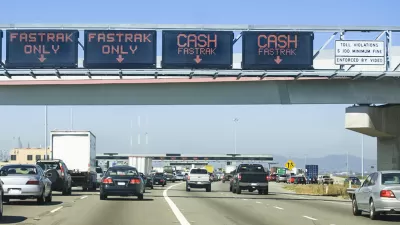It's time to fund federal transportation like most other nations do—rely less on highway user fees that dedicate funds to highways and transition to funding roads from the general fund, perhaps in the same amount that they contribute to GDP.
Joshua L. Schank, president and chief executive of the Eno Center for Transportation, makes a convincing case in this New York Times op-ed for essentially ditching the Highway Trust Fund - a protected, dedicated source of funding that was born with the interstate highway system, and relying more on dedicated general funds that he believes will be "somewhat insulated from the political forces that surround transportation funding, and more focused on getting the federal government the maximum return on its investments."
No other developed nation relies so heavily on user fees like the gas tax. While other countries typically have much higher gas taxes, they do not dedicate these revenues to transportation. Instead, they use general revenues.
So should America. One option is to dedicate part of the income tax revenue that corresponds to transportation’s contribution to gross domestic product, or about 10 percent (around $160 billion). Dedicating even half of that to transportation would cover America’s needs and effectively align transportation with economic growth.
After all, that's exactly what this country has been doing since 2008. "We have infused the trust fund with over $55 billion in general fund revenues (not including stimulus funding), and proposals from the president and the House of Representatives have called for $150 billion and $125 billion more, respectively, both funded through corporate tax reform," he writes.
The problem with these actions and proposals is that they are one-time, short-term fixes, while transportation projects take years to complete. Effective modern transportation is less about building more highways, and more about operating our existing systems more effectively while harnessing the benefits of technology.
Eno's suggestion goes against the user-fee principle that has been the basis of federal and state transportation funding for almost a century, beginning with Oregon's 1919 gas tax. [The federal government was a little late to the game, initiating its per-gallon tax in 1932.] It adds a new dimension to transportation funding policy that leaders should take seriously, particularly those who oppose raising taxes.
FULL STORY: America’s Highways, Running on Empty

Planetizen Federal Action Tracker
A weekly monitor of how Trump’s orders and actions are impacting planners and planning in America.

Restaurant Patios Were a Pandemic Win — Why Were They so Hard to Keep?
Social distancing requirements and changes in travel patterns prompted cities to pilot new uses for street and sidewalk space. Then it got complicated.

Maui's Vacation Rental Debate Turns Ugly
Verbal attacks, misinformation campaigns and fistfights plague a high-stakes debate to convert thousands of vacation rentals into long-term housing.

In California Battle of Housing vs. Environment, Housing Just Won
A new state law significantly limits the power of CEQA, an environmental review law that served as a powerful tool for blocking new development.

Boulder Eliminates Parking Minimums Citywide
Officials estimate the cost of building a single underground parking space at up to $100,000.

Orange County, Florida Adopts Largest US “Sprawl Repair” Code
The ‘Orange Code’ seeks to rectify decades of sprawl-inducing, car-oriented development.
Urban Design for Planners 1: Software Tools
This six-course series explores essential urban design concepts using open source software and equips planners with the tools they need to participate fully in the urban design process.
Planning for Universal Design
Learn the tools for implementing Universal Design in planning regulations.
Heyer Gruel & Associates PA
JM Goldson LLC
Custer County Colorado
City of Camden Redevelopment Agency
City of Astoria
Transportation Research & Education Center (TREC) at Portland State University
Jefferson Parish Government
Camden Redevelopment Agency
City of Claremont



























